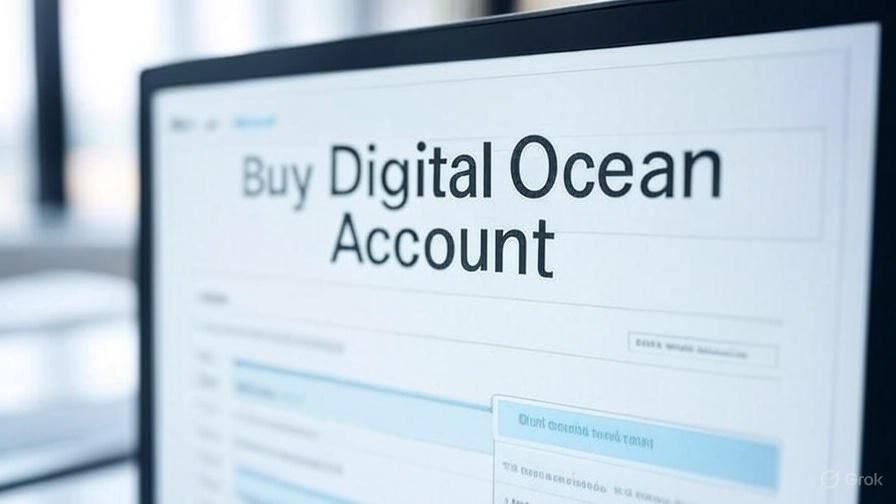In the dynamic cloud computing landscape of 2025, DigitalOcean has reported impressive Q2 results, with revenue surging 14% year-over-year to $219 million and its AI segment doubling, as highlighted in recent earnings reports. This growth underscores the platform’s appeal to developers and digital native enterprises seeking scalable infrastructure. However, a parallel trend is gaining traction: the secondary market for pre-owned buy DigitalOcean accounts. As demand for cost-effective cloud solutions rises, individuals and businesses are increasingly turning to third-party sellers to acquire established accounts, potentially bypassing setup delays and leveraging existing resources.
This emerging practice, while tempting, comes with substantial risks, as evidenced by community discussions and expert analyses. Recent reports from cybersecurity firms like Netskope indicate a sharp increase in cloud-based threats, with malicious activities on IaaS platforms multiplying 17-fold in the past year. DigitalOcean’s Terms of Service (TOS), updated on July 25, 2025, explicitly outline restrictions on account transfers and reselling, creating a complex environment for such transactions. Industry watchers, including analysts from Seeking Alpha and Mordor Intelligence, project the global cloud market to exceed $855 billion this year, with a CAGR of 21.20% through 2030, fueling interest in alternative acquisition methods but also amplifying compliance concerns.
Developer forums such as Reddit and Stack Overflow abound with cautionary tales: from sudden account suspensions due to flagged activities to unresolved billing disputes post-purchase. One notable incident involved a startup locked out of their account after a third-party transfer triggered fraud detection algorithms, echoing broader issues in cloud account management. As regulatory scrutiny intensifies—particularly around data privacy laws like GDPR and sanctions from OFAC—buyers must prioritize due diligence to avoid legal and operational pitfalls. For deeper insights into cloud security trends, check out Netskope’s Threat Labs.
Recent Developments in the Cloud Secondary Market
The secondary market for cloud accounts has evolved alongside the industry’s expansion. DigitalOcean’s focus on AI and GPU infrastructure, including partnerships for high-density servers, has attracted more users, indirectly boosting interest in pre-configured accounts. Market analyses show that while hyperscalers like AWS dominate with 31% share, niche players like DigitalOcean are gaining ground among SMBs and developers, holding significant portions in storage infrastructure.
However, this market remains unregulated, leading to scams and compliance breaches. A 2025 report from emma.ms notes the fragmentation of the cloud market, with smaller providers challenging giants through specialized offerings. Experts warn that purchasing pre-owned accounts can expose buyers to inherited violations, such as intellectual property infringements or unauthorized content hosting, as seen in Plex server terminations on DigitalOcean.
In response, DigitalOcean has reinforced its policies, emphasizing user responsibility for security and compliance. Analysts from AInvest suggest a “hold” stance on such practices until clearer transfer mechanisms emerge, citing margin pressures and retention challenges in the broader market.
Understanding the Risks of Third-Party Purchases
Acquiring a DigitalOcean account from a third party can seem efficient, offering immediate access to droplets, spaces, and potentially unused credits. Yet, the risks are multifaceted:
- Security Vulnerabilities: Inherited accounts may harbor malware or backdoors, as hackers exploit platforms for phishing. DigitalOcean’s security section (4.6) places responsibility on users for configurations and backups.
- Financial Liabilities: Unresolved bills or overages can lead to charges, with TOS Section 6.3 authorizing automatic recurring payments. Community reports highlight unexpected lockouts from billing disputes.
- Legal and Compliance Issues: Transfers without consent violate Section 14.3, and non-compliance with AUP (Section 5.1) or sanctions (5.7) can result in termination. Experts note risks in international deals under export controls (5.8).
- Performance Mismatches: Free bandwidth perks are revoked upon transfer (5.6), potentially increasing costs.
These risks are compounded by the lack of direct transfer support; resources must be recreated from snapshots, per DigitalOcean docs.
Expert Insights on Safe Practices
Cloud experts unanimously advise caution. A review on HostAdvice praises DigitalOcean’s transparency but warns against unofficial channels. On Reddit, users criticize third-party dealings for overpricing and unreliability. Migration specialists recommend official snapshots over full account buys.
Yancey Spruill, DigitalOcean’s CEO, has emphasized democratizing AI access, but internal policies prioritize verified users. Analysts predict formal transfer tools may emerge, but until then, new accounts are safer.
A Detailed Checklist for Buyers
To navigate these challenges, follow this expert-curated checklist, drawn from official documentation and community experiences:
Checklist: Essential Factors to Consider
- Account Verification: Ensure the account has completed payment and email verification. Request 2FA proof, as per support docs. Test access pre-purchase to avoid scams.
- Transfer Processes: Use team invites for ownership changes; recreate droplets from snapshots, as direct transfers aren’t supported. Obtain written consent if needed (Section 14.3).
- TOS Compliance: Verify no AUP violations (Section 5.1) or sanctioned locations (5.7). Prohibit reselling (4.8.0.g for Cloudways).
- Security History: Demand disclosure of breaches (5.9). Change credentials immediately and enable backups (4.6).
- Billing Integrity: Check for balances; understand recurring charges (6.3) and taxes (6.4). Avoid hidden overages.
- Asset Review: Inspect for malware; recreate resources to ensure integrity. Align DNS and domains.
- Seller Reputation: Vet through references; avoid anonymous sellers flagged in communities.
- Legal Protections: Secure indemnification agreements; comply with privacy (4.8.e). Seek legal counsel for cross-border deals.
- Post-Acquisition Actions: Update security, monitor activity, and consider notifying support.
- Alternatives: Opt for new accounts with promotions; explore migrations via pg_dump for databases.
Adhering to this checklist minimizes risks, aligning with expert recommendations for secure cloud operations. For additional guidance on cloud compliance, visit Stack Overflow for community-driven insights.
Future Outlook and Recommendations
As DigitalOcean expands its infrastructure to 17 data centers, the secondary market may mature with better tools. For now, experts like those from Northflank suggest evaluating alternatives for 2025. Prioritize official channels to leverage growth while ensuring compliance and security.
Conclusion
while the allure to acquire a pre-owned DigitalOcean account persists amid market booms, informed caution is paramount. This approach not only safeguards investments but positions users to thrive in the evolving cloud ecosystem.

